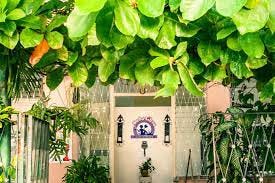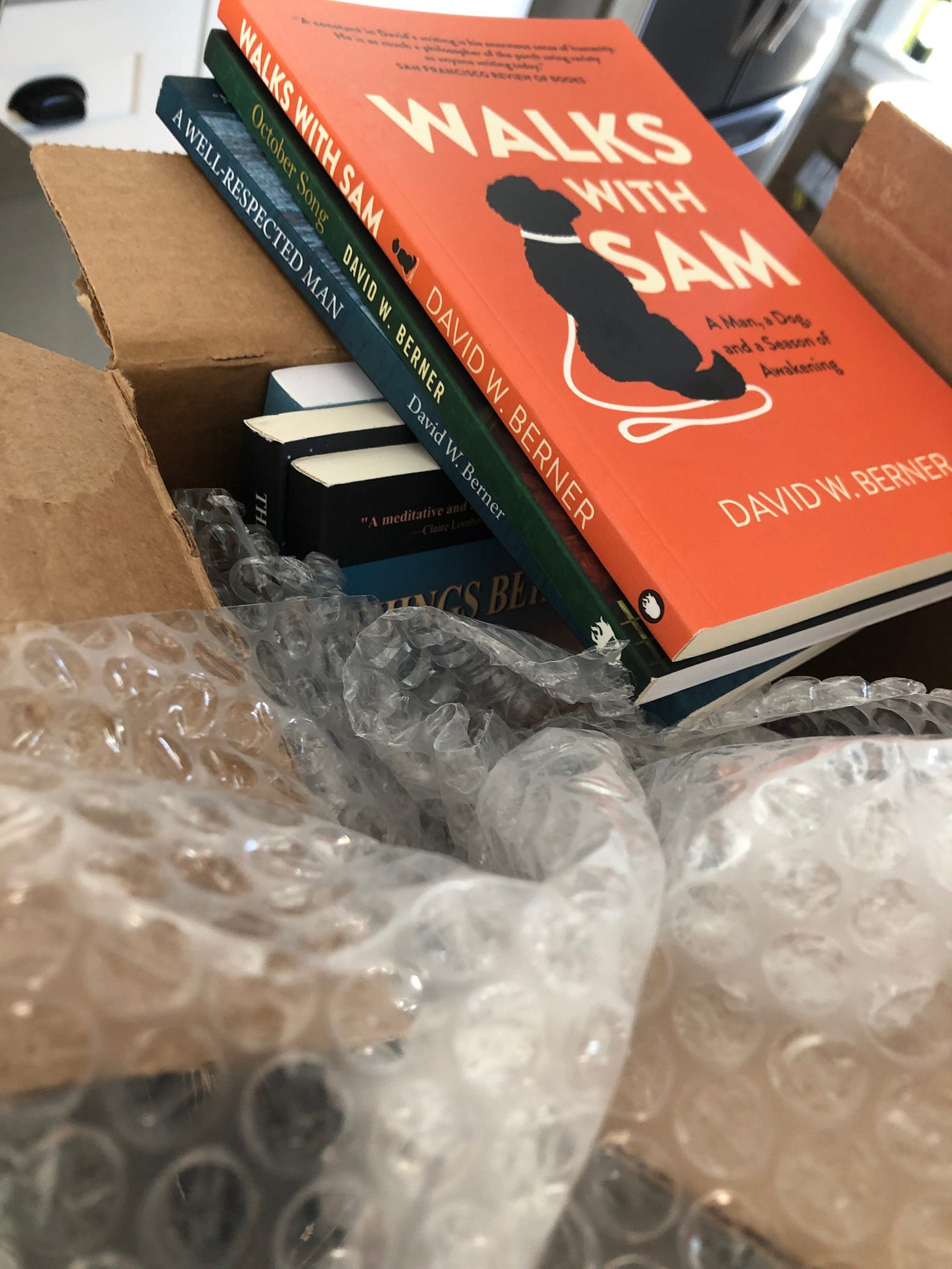It had been a long day in the hot sun. And now, in late afternoon, a few hours before dinner my sons and I are back at our room at the Hotel Raquel in the historic section of Old Havana with the air conditioning, as good as it could be inside a 1905 marble-column building, cranked high.
“A nap sounds like the right plan before we go to eat,” I suggest.
So we do, resting in big beds under cool linens. Above us are tall ornate ceilings and to the right two large windows with views of the cobblestone street and the garden below.
My sons are out quickly. But I can’t sleep. It had been a long day. A steamy bus ride to the Hemingway house—Finca Vigia—in the hills outside Havana. We walked the property, looking through the open windows at the large spaces lined with books, the heads of antelopes mounted to the wall. The writer’s manual typewriter on his desk in the back office. There were the four graves for his dogs, including his favorite, Black. And down the walkway from the home, the restored 38-foot fishing boat, Pilar, inside an open but covered boathouse. We drank mojitos at the small outside cafe near the entrance to the property and sat under the ceiba trees. I had waited many years to make this trip, come to this place, and to do it with my sons had been overwhelming. I am emotional and tired, but I cannot close my eyes, although I try.
I write the boys a note on hotel stationery.
Dinner is in two hours. Going to make that trip to the bookstore. See you in a bit.
I take the rickety iron-caged elevator to the lobby and look for a car near the square. The driver, a young man in a white shirt and a gold bracelet, rests against the driver side door with his arms crossed.
“Car for hire?” I ask in English.
The man smiles. “Si, senor.” He snaps to attention and opens the rear door to the red Chevy sedan, American made, a pre-revolution car. I hand him a small slip of paper with the address of the bookstore written on it. Cuba Libro is the only English-language bookstore in the country. The books are used, a place frequented mostly by Cubans, a sanctuary of literature and the brainchild of ex-pat, Connor Gorry, a journalist who had come to Cuba for a story and never left.
“How long?” I ask.
The driver looks at me through the rearview mirror.
“Minutos,” he says. “Fifteen.”
The car swerves and dodges in the traffic along the coastal road. The Malecon is the heart of Havana, a wide roadway along an 8 km seawall. At night the walkway is lined with young people, drinking rum, smoking, lovers embracing under the Cuban moon. This late afternoon, there are no lovers.
The driver maneuvers his car with athletic agility through the congestion and up the coast to a quiet neighborhood of small homes and tropical trees. He hesitates at a crossroads and looks at the address on the paper. He parks on the street.
“Somewhere here,” he says, waving his arm.
There is no sign, no indication of a bookstore.
“Can you wait?” I ask.
The driver nods.
With my books under my arm, I walk the street. After several attempts at finding street numbers with few in sight, I discover a short walkway along a metal fence and thick green vegetation all around. On the white door is a small sign in purple: Cuba Libro. I try to open it but it is locked.
“Hola,” I say toward the courtyard.
A young woman looks from the window and raises her finger to signal. In a moment, she opens the door.
“Hola. Connor aqui?” I ask.
“No. No,” the woman says. “We are closed today.”
“I have books. Connor was expecting.”
She smiles in recognition. “Si,” she says and allows me inside.
There are several people sitting on what I remember as a tiled floor in a small white room, books stacked around them. They appear to be cataloguing. Each looks up to me and smiles. “Hola,” I say. A chorus of “hola” is returned.
The young woman who had greeted me takes my books. “Gracias,” she says. “Gracias, gracias.”
“Please tell Connor I was here,” I say. “I’m sorry I missed her.”
The woman’s smile is wide, her dark eyes alive. “Gracias,” she says again and smiles.
“Oh, no,” I say. “It is me who is grateful. I’m the one who has been given a gift. I can’t tell you how privileged I am to do this.”
I have come to Havana and have been given the chance to offer my words to a world of literature few in Cuba can experience. I have come to the forbidden country, to Hemingway’s world, to an unlikely bookstore, and I have been able to share my stories in a land that has forever fascinated me.
“Adios,” I say, not wanting to leave.
This was nearly four years ago. And today, an email comes from Cuba Libro, an unexpected post on Here is Havana, Connor’s blog. It’s a desperate post. Life in Cuba is bad. The pandemic. The economy. The American sanctions hurting the people, not the government. I tire of such idiocy, Connor writes. Cuba is in deep waters, she continues, it has become an infuriating and constant struggle to keep a small business alive, to keep Cuba Libro’s doors open. I can’t tell you how many times I’ve considered closing shop over the past two years. Without the support (financial, spiritual) from our friends abroad, we would already be history. And we aren’t out of the woods yet.
I immediately, anxiously reply to the post, and remind Connor of my visit years ago. I am alarmed, I write. The bookstore is a fond, beautiful memory. I want to send you books, Can I do that? Is it possible?
In time, she responds,
Hola David.
The funny thing is: during these past two years, our entire clientele has been Cuban (well, almost) and we have sold A LOT of books. Our collection dwindles. We have young Cubans asking every day for certain titles and a copy of our title list. Yesterday a young man who bought a Nabokov collection and Crying of Lot 49 (heady stuff!) also asked after a biography of Napoleon and anything on the Rolling Stones. This is just one young fellow but is representative of the varied interests of our Cuban readers.
We are always looking for books, which can be sent through the mail to our PO box. But please: no murders/mysteries or romance and titles in English please. Email me and I will send you the address.
Take care and have a healthy 2022
Connor
I find a shipping box and pack seven of my books. I use bubble wrap and sticky mailing tape to secure the cardboard flaps. And I send Connor an email.
I have books. I must send them to you. Please let me know the best address.
I’m still waiting for her reply.
Tonight in bed, under a book light I read a favorite novel based in a country so full of life and spirit, a country in love with people and with words. And there on a page of Pico Iyer’s Cuba and the Night is this poignant line:
“. . . you could help people most by not giving them the burden of your heart.”
Read more about Cuba Libro, Connor Gorry, and literature in Havana.








evocative
Hi David, What a lovely piece. I could smell the sea air along the Malecon. I was reminded of my treks to Havana 2004-2007 to study Afro-Cuban rhythms and dance. I would take a stack of my children's books and donate them to local schools. I also recall their annual book fair in the "Castle." Fond memories. Thank you, Sherry